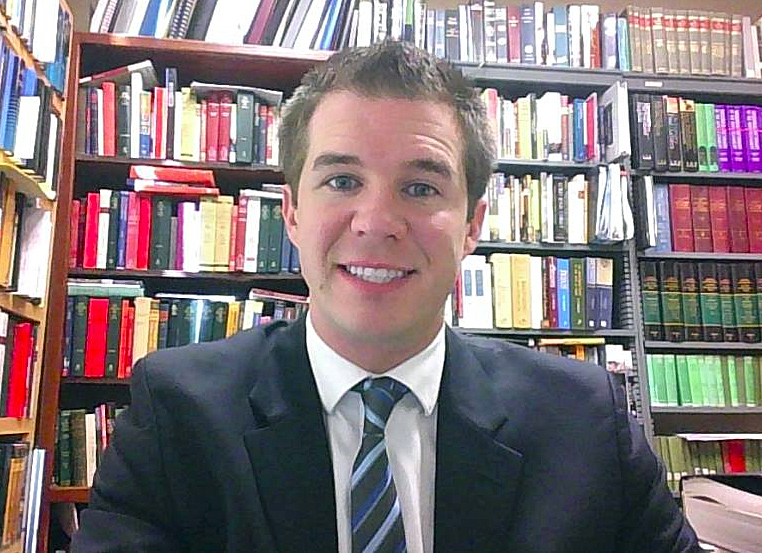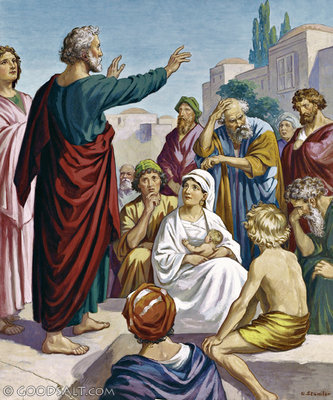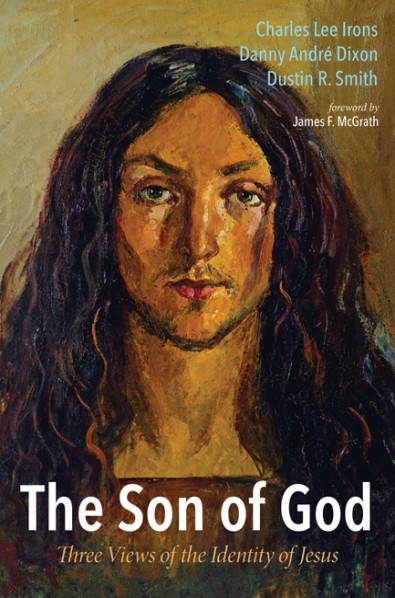Podcast: Play in new window | Download
Subscribe: Spotify | Email | RSS

In this last of three interviews with the authors of The Son of God: Three Views of the Identity of Jesus, we talk with Dr. Dustin Smith of Atlanta Bible College. Topics discussed include:
- How Dr. Smith came to hold this view, starting from a more conventional evangelical point of view.
- In what sense is this a “Socinian” christology?
- Why in the book does he start his case by focusing on the Old Testament?
- When in his view did Jesus begin to exist?
- How does Dr. Smith address objections that in his view Jesus is “just a man,” unable to atone for the sins of humanity, forgive sins, receive worship, or be called “Lord”?
- If this christology is, as alleged, biblical, why is it so unpopular with traditional, non-theologically-liberal Christians?
- How has this change of views about Jesus affected his spiritual life?
Does Dr. Smith make a strong case? Let us know what you think in the comments below, in our Facebook group, upload audio feedback for possible inclusion in a future episode of this podcast, putting the audio file here.
You can also listen to this episode on Stitcher or iTunes (please subscribe, rate, and review us in either or both – directions here). It is also available on YouTube (you can subscribe here).
You can support the trinities podcast by ordering anything through Amazon.com after clicking through one of our links. We get a small % of your purchase, even though your price is not increased. (If you see “trinities” in you url while at Amazon, then we’ll get it.)
- The Dustin Martyr Blog
- The Son of God: Three Views of the Identity of Jesus
- Paradoxical Conquering in the Apocalypse of John
- Atlanta Bible College
- podcast 61 – Dr. Dustin Smith on preexistence in ancient Jewish thought
- podcast 62 – Dr. Dustin Smith on the preexistence of Jesus in the gospel of John
- texts discussed in this interview
- Colossians 1:14-18
- Matthew 1:1-25
- Luke 1:26-38, Luke 3:21-38
- Proverbs 3:19; Proverbs 8:1-31
- Wisdom 7; Wisdom 9
- Baruch 3
- Hebrews 1:1-9
- 2 Samuel 7:14
- Psalm 2:7
- Hebrews 1:10-12
- Psalms 102:25-27
- Deuteronomy 18:18
- Acts 2:22
- Romans 5:12-21; Romans 17:31
- 1 Timothy 2:5
- John 20:23
- Psalm 110:1

- 1 Chronicles 29:20
- Acts 2:36
- Philippians 2:5-11
- Hebrews 2:18; 4:15
- Mark 10:45
- related trinities posts and podcasts
- This week’s thinking music is “You’re Right But I’m Me“ by Doctor Turtle.



Perhaps the most significant issue here is the use of the term “Socinian”…. Why, in God’s name, would anyone use the label of such a late date personage’s Christology???
Why start off by shooting yourself in the face???
Sadly, while espousing the Messianic/Apostolic Christology in contrast to the later traditions espoused by his colleagues, Dustin provides a surprisingly poor exegesis to such basic texts as Col1:16 and really struggles with Heb. I am uncertain why he did not simply stick to the plain, clear text of Col1:16 to understand ta panta – which, clearly, has nothing to do with the physical creation… I would suggest that while I understand his reference to a divine passive, I don’t find it meaningful to make much of it. Clearly God is the agent – I suppose if that is his point – sure, fine.
Additionally his approach is not nearly the best. As an example, since we are specifically discussing Apostolic Christology – why not start at the beginning with the Apostle’s specific statements – Jesus of Nazareth – a M-A-N – attested by GOD, etc. (Acts2:22ff)
Further, there was no focus the two most critical issue – the hermeneutic AND the denial of the human person of Jesus by the trins formally (the anhypostasis) and Arian informally (they will never admit it for the obvious reason but in light of the essence of their Christology, they necessarily deny that Jesus is a genuine human person as well – since human persons DO NOT KNOW OF THEMSELVES BEFORE ABRAHAM….
I am inserting this comment here because I don’t know where else is appropriate. The fundamental practical implication of disavowing Jesus’ possession of one “essence” with the Father is that it demands a significant “re-visioning” of one’s devotional life as a Christian. It implicates a lifelong life of worship, prayer, and belief devoted to Christ as a practice of which Jesus is unworthy. The chasm between Christ as eternal Deity worthy of trust, love, and obedience and Christ as an exalted human who is worthy of great homage and worship is a vast chasm. If one conscientiously believes in the first Commandment in the Decalogue, and if one then seeks to identify the differentiation between unitarian and trinitarian Christians, doesn’t the exercise necessitate that you conclude that the other group (whatever you are not) is committing some form of idolatry?
K71
While I appreciate the rather erudite manner of your presentation – literally every facet is steeped with non-Biblical tradition and assumption.
Had you based your thinking squarely on the full counsel of God, you would not even need to ask these questions. You would simply and quietly accept that the truth God wants you to come to is very straight forward – There is one God – the Father – and one mediator between men and God – the M-A-N Christ Jesus. (1Tim2:4, ICor8:6, 1Tim2:5).
Best
Greg
Kierkegaard71,
Even though I also wouldn’t espouse the Preexistence of Christ doctrine, I don’t find Dunn’s particular approach to Philippians 2:5-11 compelling either. He’s developed what’s called an “Adam Christology” paradigm which I think is what is controlling his interpretation of the passage. I think a couple of grammatical mistakes Dunn makes are a critical problem for his view (in addition to his overestimation of the significance of “Adam” in Paul’s understanding of the gospel).
First, Dunn’s definition of MORFH (translated “form”) is not consistent with the biblical usage of the word. Second, Dunn assumes that the Present Participle verb used of Jesus “existing in the form of God” should be construed as a Past tense (which is not necessary in that context at all). This makes all the difference in how he is attempting to connect “the form of God” with Genesis 1:26 and the earthy ministry of Jesus.
Hearing the explanation of Dunn’s treatment of Colossians 1, it sounded plausible; however, I wonder if it is just another valiant attempt at trying to source a biblical text without a whole lot of solidity. Is Dunn driven more by the text or, is he already pre-disposed toward a non-preexistence understanding of Christ as he comes to the text?
A question I would like to ask here just for purely being interested in your broad-minded response Q: If Adam was formed aka created and then brought to animated life (via the Breath of God) how did his persona (blue-print) that which made him uniquely Adam come into being? I ask this since he was not a baby first, he didn’t seem to grow into a man, and was therefore not formed by his culture, family life and the environment he grew up in. Could it be impossible then with God to do something similar with the second Adam, Jesus? God clearly created a body for him “but a body hast thou prepared for me” (albeit Septuagint it is from an older an not necessarily less true text source… ), apart from his animated life given in the womb, was it impossible with God to transpose his person? So that in the end although he was a sinless unique, and human creation he was still the very messenger of the covenant (that very same person), in essence, that came to his temple? If you find this to be implausible can you give clear give substantial reasons from why this “incarnation” just cannot be Biblically true?
It seems that Adam had both God and the plant and animal kingdom as his family and shaping influences before he expressed loneliness for one who was more like himself. One thing we do know about him from this period is that he named the animals. Did he have the character of a loving animal carer like we see so often today? Also, we have no way of knowing how long it was that Adam was “alone” with God before Eve was created to keep him human company. In any case the creator of all things would have been able to school him in any necessary matters of science and humanities even before the physical realities had fully come to be.
Jeff,
Why would we speculate that Adam was “alone” for any more than a few hours since it all happened during “the sixth day” according to Genesis 1:26-31? A “day” with a numeral and “evening and morning” always means a 24-period of time throughout the Hebrew scriptures.
Another consideration is that the “garden” and “field” language associated with Adam’s location and the plants and animals in Genesis 2 indicates that he was only responsible for cultivating a small area with a limited number of docile animals. Hence, there’s no reason to think he had to learn much more than simple farming and tending of livestock.
Quick question:
Why does Jesus have to been born of a human mother(Mary)? Adam who was a human being, was created without a human mother or father. Why couldn’t have baby Jesus been directly created like Adam.
If a miracle is needed to explain Mary’s pregnancy, why not go bigger and badder and do it without Mary too. Why couldn’t God just say “Hey Mary, I made you a baby- take care of him”.
I don’t understand the necessity of being born in a womb, especially when we start using the M-Word(miracle).
Well, I haven’t thought about this for very long but, in order for there to be some kind of fulfillment of Jesus being a descendant of Abraham, Isaac, Jacob, and King David there would have to be some kind of biological connection.
Related to that, since Adam was the only man directly created by God without the use of human parents that makes all of us like him, from him, and “under” him in a sense. If Jesus were just created out of dirt then he could be said to not be of “the seed of the woman” (which again is another promise). But also, Jesus could not be seen as a justifiable candidate to die in our place because in a sense even though he would be human, he would not be from the common lineage as we know it. He’d almost be like a separate human race. Like if there were alien humans on another plane that had nothing to do with us, our curse, our sin, our fallen nature, etc.
Raymond,
I think the reason is because much of the significance of being “the Christ” and “the son of God” didn’t follow from Adam, but followed from the promises made to Abraham and his descendants to whom were given the promise of the Land (Genesis 15:18) and the kingdom (2 Samuel 7:13-14). Thus, it seems that the apostles understood that it was necessary for Jesus to have a genealogy associated with Abraham and David (Matthew 1:1). It was also critical to Paul’s understanding of the gospel that Jesus was “the seed” (singular) of Abraham to whom all of the promises were intended (Galatians 3:16).
Thanks Aaron, Rivers for your response.
I wasn’t attempting to re-direct the subject matter of the podcast. After listening to Dr Smiths Christology and its emphasis on Christs Humanity- it made me think about the source and necessity of Christ human nature..
I started to reflect on the metaphysical necessity of our atoning sacrifice being like us (human). God appeared to have accepted animal sacrifices prior to Jesus atonement.
I just wondered prior to God actualizing any particular world, could have God used any creature as the atoning sacrifice for a sinful creation.
In other words, if we do in fact discover other sentient beings, in other parts of the Universe, who are also morally culpable, would Christs atoning sacrifice cover their sinfulness also, or would they need their own particular “Christ”. If they in fact needed their own particular Christ, would not that lead to a possible infinity of Christs- thereby blowing up the concept of a “Trinity/trinity” from every perspective.
Raymond,
I think of atonement as more of a “representative” act than one of “substitution.” There are two main reasons for this.
First, I don’t think a substitutionary atonement idea is consistent with what Jesus taught about love and forgiveness. He taught that forgiveness was a matter of unconditional grace and not retribution or recovery of debt. This comes through in many of his sayings and parables.
Second, I don’t think a substitutionary view of the atonement is consistent with the moral principles of God’s holy Law. For example, there is no case where it was just to punish an innocent man for the crimes of other people. The Law also made provision for “mercy” which didn’t require retribution from another source either.
Comments are closed.